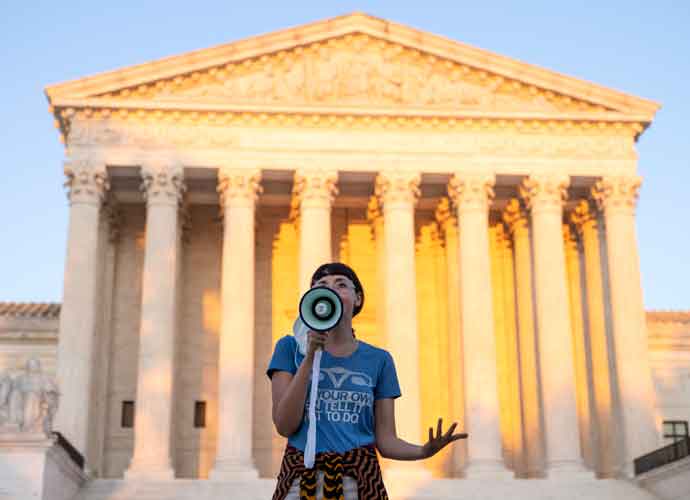

WASHINGTON, DC - SEPTEMBER 02: An activist, who declined to provide her name, speaks outside the Supreme Court in protest against the new Texas abortion law that prohibits the procedure around six weeks into a pregnancy on September 2, 2021 in Washington, DC. The Supreme Court declined to block the law and will let the legal battle play out in the lower courts. (Photo by Drew Angerer/Getty Images)
In a 6-3 decision on Thursday, the Supreme Court ruled that colleges and universities cannot continue employing race-conscious admissions policies, with the majority arguing that affirmative action in higher education is discriminatory against white and Asian American applicants.
Though the ruling does not explicitly overturn prior cases endorsing affirmative action, it will now serve as a precedent for future cases and will likely disrupt the admissions processes of institutions across the country.
The justices ruled against Harvard College and the University of North Carolina, whose admissions programs were challenged by the Students for Fair Admissions group and found to be lacking “sufficiently focused and measurable objectives warranting the use of race,” as Chief Justice John Roberts wrote in his concurrence.
“Nothing in this opinion should be construed as prohibiting universities from considering an applicant’s discussion of how race affected his or her life, be it through discrimination, inspiration, or otherwise,” Roberts continued. “But, despite the dissent’s assertion to the contrary, universities may not simply establish through application essays or other means the regime we hold unlawful today.”
Subscribe to our free weekly newsletter!
A week of political news in your in-box.
We find the news you need to know, so you don't have to.
The dissenting opinions came from Justice Sonia Sotomayor, Justice Ketanji Brown Jackson and Justice Elena Kagan, all Democrats. Sotomayor and Jackson each wrote their own dissents.
Sotomayor said that the Supreme Court’s ruling “cements a superficial rule of colorblindness as a constitutional principle in an endemically segregated society where race has always mattered and continues to matter.”
Jackson bluntly agreed, stating that “Our country has never been so colorblind.”
“If the colleges of this country are required to ignore a thing that matters, it will not just go away,” Jackson continued. “It will take longer for racism to leave us. And, ultimately, ignoring race just makes it matter more.”
Affirmative action opponent Edward Blum, the leader of Students for Fair Admissions, praised the Supreme Court’s decision, saying it “marks the beginning of the restoration of the colorblind legal covenant that binds together our multi-racial, multi-ethnic nation.”
Rallies were held outside the U.S. Supreme Court while the justices heard oral arguments from both sides. Students all over the country have taken to social media to condemn the ruling.
With many of the Fédération Internationale de Football Association (FIFA) Club World Cup tournaments scheduled…
During an interview with Fox Business on Tuesday, Sen. John Kennedy (R-Louisiana) froze during his…
President Donald Trump’s approval rating has dropped to 38%, the lowest level in his second…
Right-wing conservative Candace Owens accused President Donald Trump of thinking his voters are "stupid," amid…
President Donald Trump is calling for Sen. Adam Schiff (D-California) to be arrested for alleged…
Rep. Mike Lawler (R-New York) announced Wednesday he will not run for governor and will…